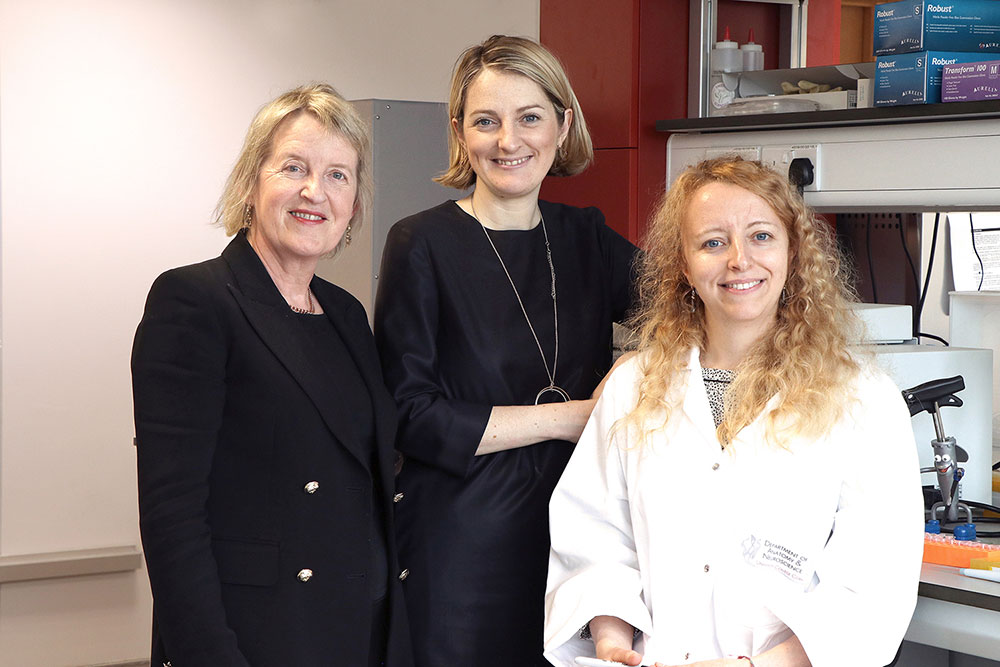In This Section
- Home
- Staff Profiles & Phone Book
- About the Department
- Welcome from Head of Department of Anatomy and Neuroscience
- A History of the Department
- A history of the Department; The early years to the 1980s
- A history of the Department; The move from the Windle Building to BSI and WGB
- UCC Professors of Anatomy and Heads of Department
- The development of the UCC HUB
- Current students, recent research graduates and awards
- Useful Links
- Study Anatomy
- Study Neuroscience
- Research
- Neural circuitry underlying Neuropsychiatric and Neurological Disorders 2026
- Neurogastroenterology 2026
- Developmental Neuroscience and Regeneration 2026
- Neurodegeneration 2026
- Neuroinflammation 2026
- Neuroprotection and Therapeutics 2026
- Neuroproteomics and Molecular Psychiatry 2026
- Anatomy Education Research 2026
- Research Facilities 2026
- Postgraduate Research Programmes 2026
- UCC Anatomical Donations
- Biosciences Imaging Centre
- BSc Medical and Health Sciences
- News & Events
- News Archive 2024
- News Archive 2023
- News Archive 2022
- News Archive 2021
- News Archive 2020
- News Archive 2019
- News Archive 2018
- News archive 2017
- News Archive 2016
- News Archive2015
- News Archive 2014
- News Archive 2013
- News Archive 2012
- News Archive 2011
- BRAIN AWARENESS WEEK 2023
- Department Events and Conferences
- Seminar series 2019_2020
- photo galleries
- Narrowing the void Conference 2023
- Photos of BSc Medical and Health Sciences Mentoring launch 2022
- International Women's Day 2023
- 2023 BRIGHT FUTURES - Celebrating our researchers
- 2023 UCC Futures - Future Ageing & Brain Sciences
- Recent Graduations July 2023
- Anatomy and Neuroscience Top 100 Anatomy Physiology 2023
- BRAIN AWARENESS WEEK 2023 FUN AND GAMES EVENT
- Medical and Health Sciences First year class 2023
- 2023 Brain Awareness week Scientific discussion photo gallery
- World Anatomy Day 2023
- BSc MHS MENTORING PROGRAMME 2023
- BSc Medical and Health Sciences Graduation 2023
- BSc Neuroscience Graduation Photo Gallery 2023
- Dr Kathy Quane Nov 2023
- THANKSGIVING PHOTOS 2012
- Photo Gallery: Society of Translational Medicine Careers Fair 2023
- Photo Gallery:2023 TRAIN AWARDS
- Photo Gallery:2024 Creative Week St Joseph's NS
- Photo Gallery: Department of Anatomy and Neuroscience Thanksgiving Service 2024
- Photo Gallery: Professor Aideen Sullivan farewell party
- Photo Gallery: Irish Pain Society Annual Scientific Meeting Cork 2023
- Photo Gallery: 2024 Medical and Health Sciences Graduation
- Photo Gallery: Medical and Health Sciences Meet and Greet 2024
- Photo Gallery: 2024 BSC NEUROSCIENCE Graduation
- Photo Gallery: 2025 INTERNATIONAL WOMEN'S DAY
- Photo Gallery: 2025 BSc Neuroscience class and staff
- Photo Gallery: 2025 BRAIN CONNECTIONS
- BSc Neuroscience Graduation Photo Gallery 2025
- World Anatomy Day 2025
- UCC Learning and Teaching Showcase 2025
- MSc Human Anatomy Graduation Photo Gallery 2025
- Narrowing the Void Conference 2023
- Department of Anatomy and Neuroscience Contact Us
Gut health plays a role in Alzheimer’s development, new study says

Conference presentation: Alzheimer’s Research UK 2022 Conference. New research, which hasn’t yet been peer reviewed, presented at the Alzheimer’s Research UK Conference 2022 at the Brighton Centre, and profiled in the New York Post highlights newly identified links between gut bacteria, inflammation and brain changes associated with Alzheimer’s disease.
In research conducted by Dr. Stefanie Grabrucker, a postdoctoral researcher at APC Microbiome Ireland, University College Cork led by Professor Yvonne Nolan, stool samples from people with and without Alzheimer’s disease (recruited through collaboration with Dr. Annamaria Cattaneo, IRCCS, Italy) were transplanted into rats.
Professor Yvonne Nolan, who is leading this collaborative Centres of Excellence in Neurodegeneration (CoEN) project with partners in King’s College London and IRCCS, Italy and who presented the work said:“We found that rats with gut bacteria from people with Alzheimer’s performed worse in memory tests, didn’t grow as many new nerve cells in areas of the brain associated with memory and had higher levels of inflammation in the brain.”
"Our findings suggest that symptoms of Alzheimer’s may, in part, be caused by abnormalities in the gastrointestinal tract. While it is currently proving difficult to directly tackle Alzheimer’s processes in the brain, the gut potentially represents an alternative target that may be easier to influence with drugs or diet changes.”
Alzheimer’s is the leading cause of dementia. With one in three people born today likely to develop dementia in their lifetime, scientists are exploring potential links that could help uncover approaches for new treatments. This includes work to better understand the health of our gut and our brain.
The gut is host to a community of bacteria called the intestinal microbiome. The precise make-up of the microbiome differs between individuals, in both the types and quantities of bacteria present. This microbial composition can have far-reaching effects on other parts of our body and emerging evidence has suggested a relationship with brain health and the risk of diseases like Alzheimer’s.

The work is profiled in the New York Post: The secret to stopping Alzheimer’s is in your gut, not brain, experts say.
The research described here was funded as part of the Network of Centres of Excellence in Neurodegeneration (COEN) https://www.coen.org/ coordinated by Professor Yvonne Nolan on “Gut microbes, Neuroinflammation and Alzheimer’s disease: determining the immunoregulatory role of gut microbiota on brain and behaviour”. Principal Investigators are Yvonne Nolan and Cora O’Neill (Republic of Ireland, funded by Science Foundation Ireland (SFI)), Annamaria Cattaneo (Italy, funded by Ministero della Salute (MDS)), Sandrine Thuret (UK, funded by the Medical Research Council (MRC))
Photograph B.Riedewald
Department of Anatomy and Neuroscience
Anatamaíocht agus Néareolaíocht
Contact us
Room 2.33, 2nd Floor, Western Gateway Building, University College, Cork, Ireland
